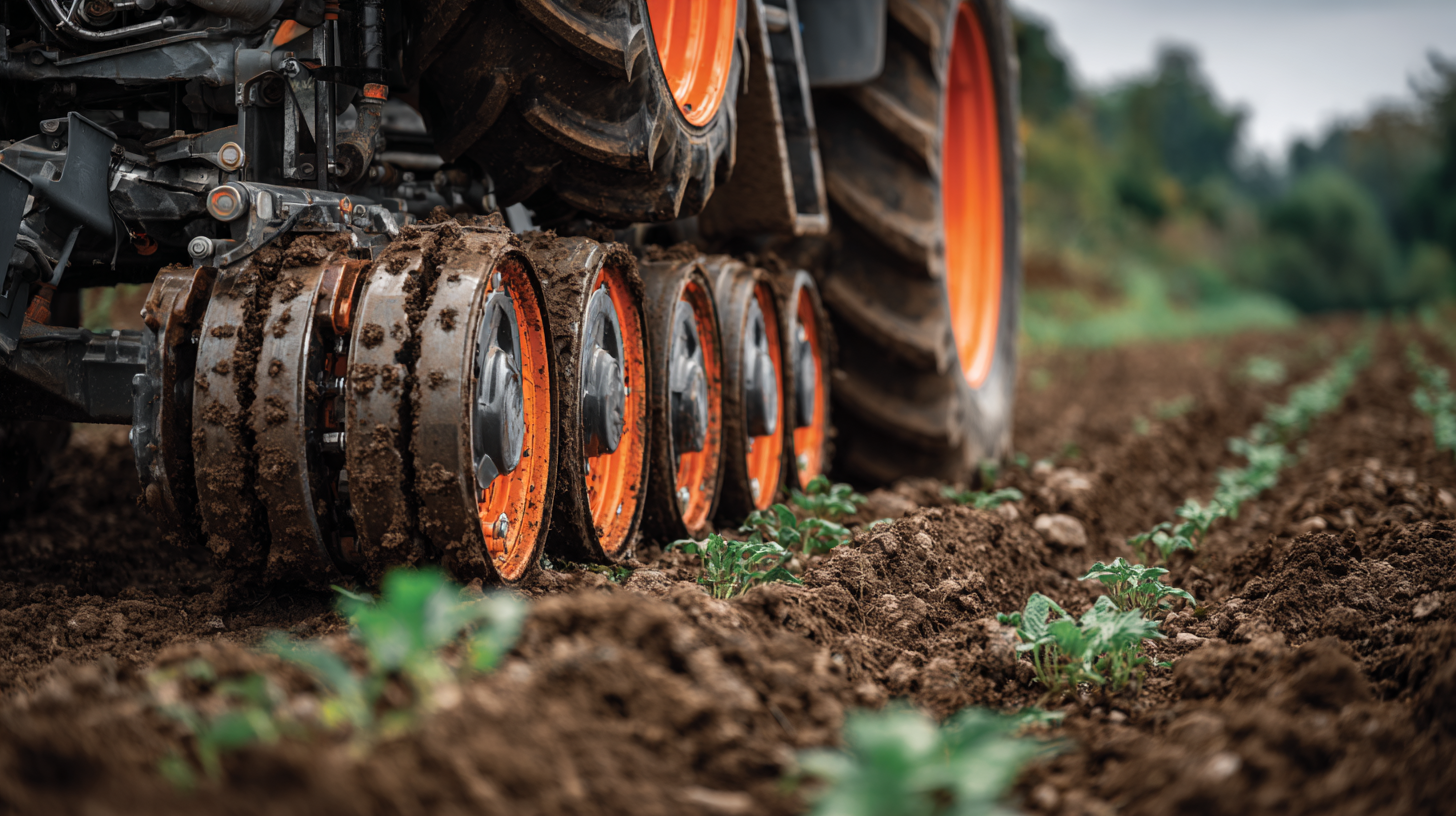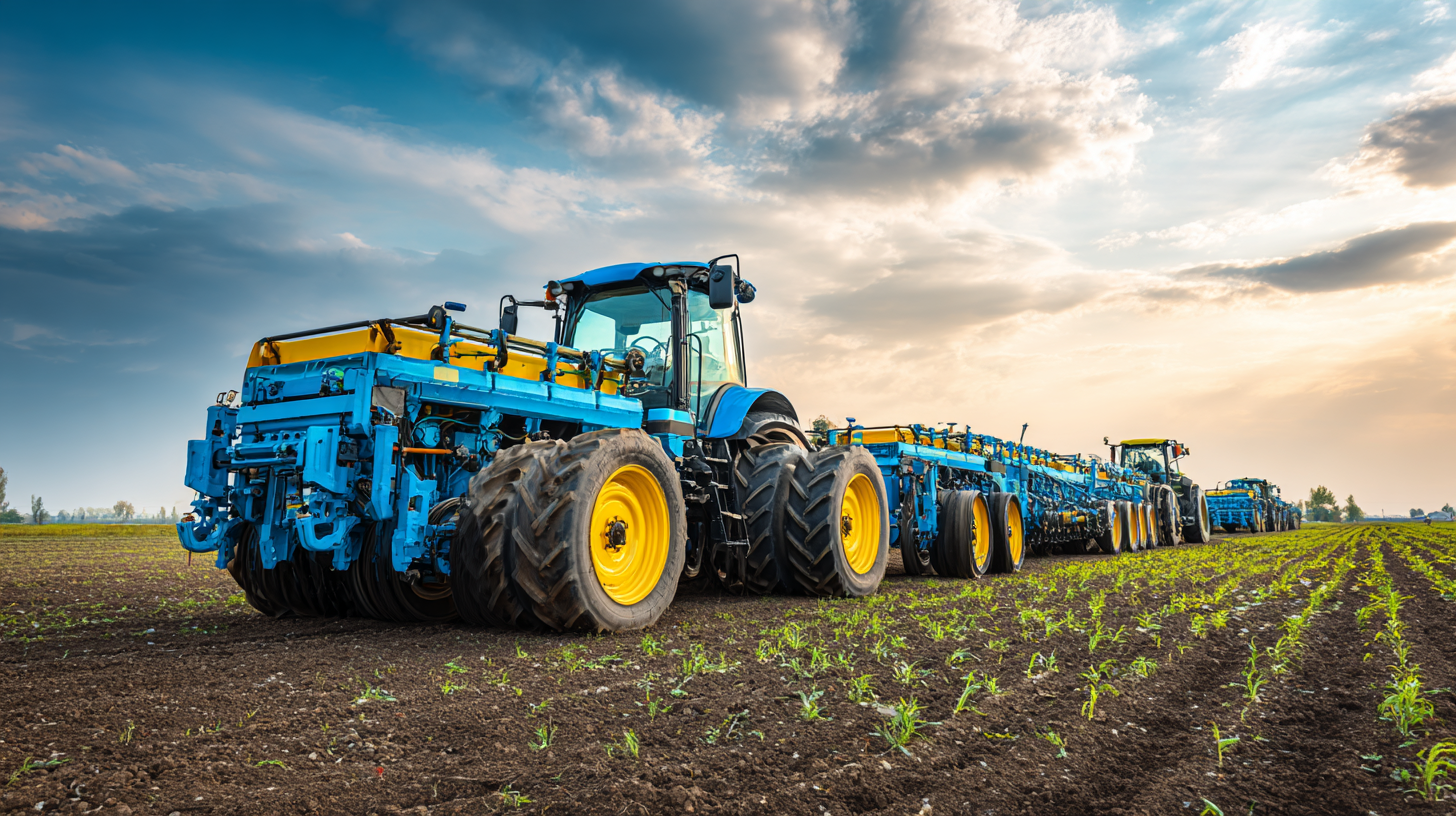Global Excellence in Agricultural Bearings: Elevating Quality Through Chinese Manufacturing
The agricultural industry relies heavily on precision-engineered components, with agricultural bearings playing a pivotal role in ensuring the efficiency and longevity of machinery. According to a recent report by MarketsandMarkets, the global agricultural bearings market is projected to reach USD 1.2 billion by 2026, growing at a CAGR of 4.5% from 2021. This growth underscores the increasing demand for high-quality bearings that can withstand the rigorous conditions of agricultural operations.
 Chinese manufacturing has emerged as a global leader in this sector, combining advanced technology with a commitment to quality, thereby establishing a reputation for reliability. As the agricultural landscape continues to evolve, the importance of superior manufacturing processes and consistent quality in agricultural bearings remains paramount, fostering trust among producers and contributing to sustainable agricultural practices worldwide.
Chinese manufacturing has emerged as a global leader in this sector, combining advanced technology with a commitment to quality, thereby establishing a reputation for reliability. As the agricultural landscape continues to evolve, the importance of superior manufacturing processes and consistent quality in agricultural bearings remains paramount, fostering trust among producers and contributing to sustainable agricultural practices worldwide.
The Impact of Chinese Manufacturing on Agricultural Bearing Quality Standards
The global agricultural sector is experiencing a transformative boost in quality standards, largely influenced by the advancements in Chinese manufacturing. With a focus on precision engineering, Chinese manufacturers have adopted innovative technologies that enhance the production processes for agricultural bearings. This shift not only improves the durability and performance of bearings but also leads to manufacturing practices that adhere to international quality benchmarks.
Moreover, the collaboration between Chinese manufacturers and global agricultural equipment producers nurtures an environment of continuous improvement in bearing technology. By implementing rigorous quality control measures and utilizing high-grade materials, these manufacturers ensure that their products can withstand the demanding conditions of agricultural environments. The commitment to quality not only elevates the standards of agricultural machinery but also establishes China as a key player in the global bearings market, showcasing its ability to meet and exceed expectations across diverse agricultural applications.
Global Excellence in Agricultural Bearings: Elevating Quality Through Chinese Manufacturing
| Dimension |
Standard Value |
Chinese Manufacturing Impact (%) |
Quality Improvement Measures |
| Bearing Load Capacity (kN) |
≥ 25 |
15 |
Use of High-Strength Steel |
| Operating Temperature (°C) |
-20 to 120 |
10 |
Advanced Lubricants |
| Vibration Level (mm/s) |
≤ 2.5 |
20 |
Precision Manufacturing Techniques |
| Lifespan (hours) |
≥ 5000 |
25 |
Regular Quality Testing |
| Corrosion Resistance |
High |
30 |
Use of Stainless Materials |
Innovative Technologies Driving Global Excellence in Agricultural Bearings
Innovative technologies are pivotal in reshaping the landscape of agricultural bearings, ensuring enhanced performance and durability. Chinese manufacturers are at the forefront of this transformation, integrating advanced materials and cutting-edge engineering processes. The use of high-grade steel and specialized coatings not only increases the lifespan of bearings but also reduces maintenance costs significantly. This focus on quality has positioned Chinese manufacturing as a benchmark for agricultural machinery, offering solutions that withstand the rigors of challenging farming environments.
Moreover, the incorporation of smart technologies, such as IoT sensors and predictive maintenance systems, is revolutionizing how agricultural bearings operate. These innovations allow for real-time monitoring of bearing health, enabling farmers to anticipate failures before they occur. As a result, agricultural operations can achieve greater efficiency and productivity, which is essential in today’s competitive market. By continuously pushing the boundaries of what is possible through innovation, Chinese manufacturers are not just elevating the quality of agricultural bearings but are also contributing to the overall advancement of the agricultural sector worldwide.

Key Factors Contributing to the Success of China's Bearing Industry
Chinese manufacturing has emerged as a pivotal player in the global agricultural bearings market, by focusing on quality and innovative practices. One of the key factors contributing to the success of China's bearing industry is their robust investment in research and development. By prioritizing technological advancements, Chinese manufacturers have improved bearing performance, durability, and efficiency, catering to the increasing demands of modern agriculture. This foundation of innovation not only meets domestic needs but also boosts exports, establishing China as a global leader in this critical sector.
Additionally, the emphasis on quality control plays a significant role in enhancing China's standing in the agricultural bearings industry. Manufacturers are implementing stringent quality assurance processes and adhering to international standards, ensuring their products are reliable and long-lasting.
**Tips:** When selecting agricultural bearings, consider manufacturers with certifications that reflect adherence to international quality standards. Additionally, look for companies that are transparent about their production processes and invest in sustainable practices, as these factors often correlate with higher quality products. Meanwhile, staying informed about technological advancements can help buyers make better purchasing decisions that ultimately enhance agricultural efficiency.
Sustainability Practices in Chinese Manufacturing of Agricultural Bearings
The agricultural industry demands reliable and high-quality tools, and Chinese manufacturing has risen to the occasion by implementing sustainable practices in the production of agricultural bearings. One key aspect of this commitment to sustainability is the adoption of eco-friendly materials and processes. Manufacturers are increasingly prioritizing the use of recycled materials, which not only reduces waste but also minimizes the carbon footprint associated with production. By integrating advanced technology in their processes, these manufacturers ensure that their bearings meet global quality standards while promoting environmental conservation.

In addition to selecting sustainable materials, Chinese manufacturers are also focusing on energy efficiency and waste reduction. Many companies are investing in renewable energy sources, such as solar and wind, to power their factories, which significantly decreases their reliance on fossil fuels. Furthermore, efficient production techniques are being deployed to optimize resources, minimizing the waste generated during manufacturing. Through these initiatives, Chinese manufacturing not only enhances the quality of agricultural bearings but also sets a benchmark for environmental responsibility in the industry, thus paving the way for a more sustainable future.
Comparative Analysis: Chinese vs Global Agricultural Bearing Manufacturers
When comparing Chinese agricultural bearing manufacturers to their global counterparts, several factors come into play, namely quality, cost, and innovation. Chinese manufacturers have significantly advanced in technology and production processes, enabling them to produce high-quality bearings at competitive prices. With a robust supply chain and a focus on the mass production of components, they are able to cater to both domestic and international markets efficiently, positioning themselves as key players in the agricultural sector.
On the other hand, established global manufacturers often emphasize their long-standing reputation and experience. Many of these companies have invested heavily in research and development, resulting in innovative products designed to meet specific agricultural demands. This commitment to quality and performance has earned them trust in regions where machinery reliability is paramount. However, the increasing competitiveness of Chinese manufacturers has sparked a reevaluation of pricing and quality standards in the global market, prompting established players to enhance their offerings and consider collaborative ventures with Chinese firms to leverage technological advancements and improve their supply chains.

Home
Products
Industrial Bearings
Deep Groove Ball Bearings
Self-Aligning Ball Bearings
Angular Contact Ball Bearings
Cylindrical Roller Bearings
Taper Roller Bearings
Spherical Roller Bearings
Bearing housing or Accessories
Miniature Bearing
Thrust ball bearing
Radial Spherical Plain Bearing
Pillow Block Bearing
Needle Roller Bearings
Automotive Bearings
Agricultural Bearings
Special Material Bearings
Industry Application
About Us
News
Contact Us



 Chinese manufacturing has emerged as a global leader in this sector, combining advanced technology with a commitment to quality, thereby establishing a reputation for reliability. As the agricultural landscape continues to evolve, the importance of superior manufacturing processes and consistent quality in agricultural bearings remains paramount, fostering trust among producers and contributing to sustainable agricultural practices worldwide.
Chinese manufacturing has emerged as a global leader in this sector, combining advanced technology with a commitment to quality, thereby establishing a reputation for reliability. As the agricultural landscape continues to evolve, the importance of superior manufacturing processes and consistent quality in agricultural bearings remains paramount, fostering trust among producers and contributing to sustainable agricultural practices worldwide.

